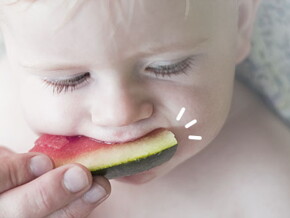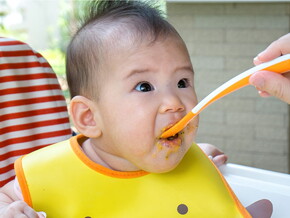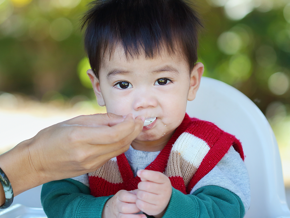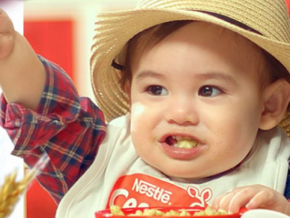
Solid Do's & Don'ts about Baby's First Food
My baby will be six months old soon and I am about to give him his first "solid" food. Why is it so important?
With the gradual introduction of "solid" foods, your baby will discover a whole world of new flavors and textures. What are the rules for making this very important chapter in baby’s life a success?
When your baby realizes that eating means asserting his personality!
Do you consider his first spoonful of carrot, camote, potato or squash a minor event? For your baby, it represents a real breakthrough!
However, thanks to the many different flavors and textures of food, your baby becomes aware that he has the power to decide which food he likes and doesn’t like. These food choices translate to his personality. The ability to select from the variety of food items you offer him will be the basic foundation of his adult food preferences. On a bigger perspective, your baby’s introduction to solid food sets the stage towards his independence and marks his entry into the world of big people.
After discovering his preferences, baby realizes that eating is FUN. Mealtime is eating with the family. (Yes, he eats at the table now, like a big boy…and this is a big change for him!) Gradually, he gets into a little routine while you have to dig deeper into your creative imagination just to get him to eat: "Neeaaoow! The airplane is turning, turning, turning!" or "Vrroomm, vrroomm! The little car has to go park in the garage!" Another enjoyable experience for baby is eating with his fingers for the first time, using his own plate and spork (or a spoon-shaped little fork).
Eating is the best thing since ...!
Eating is the first form of pleasure your baby will ever experience. He discovers solid foods and creates all kinds of funny frowns and cute facial expressions when he tastes the vegetable purée you so lovingly mashed or that little jar of banana purée. Now, that’s a lot of emotion!
Finally, the day comes when baby reigns supreme in his high chair at the family table. Finding himself the center of attention, your little one will do his utmost to make everyone laugh. Lola only has eyes for him... until a jet of purée flies from across the length of the table and up the wall! Not to worry, your baby is learning that he is part of the family, and would want to make his presence truly felt!
The first spoonful
For all of the above reasons, his first spoonful of food is a precious moment. It is up to you to prepare it carefully: buy a special baby spoon, made of soft silicone (not metal) for a nicer feel, and sit your baby at the table for the first time. Don't forget to take a photo! Pero easy lang, this big moment may turn out to be a complete fail!
Your baby might just suck on the spoon. If this is the case, let him become familiar with his spoon by allowing him to play with it. He may still have to develop the coordination he needs to eat from a spoon.
Take time to teach him how to eat off a spoon. By six months, baby can use his upper lip to take food from the spoon instead of sucking at it. He will also be able to move food to the back of his mouth and swallow.
Some babies who like to eat quickly with their fingers sometimes refuse the spoon at first. If your baby shuts his mouth tightly and won't open it, do not worry and just try again later. But if your baby spits out his food out and ends up with more food on his face than in his mouth, it may be a sign that he isn’t ready yet.
No like it!
Despite all your efforts and imagination to feed your baby, you may sometimes be faced with a big “No!” from this little one. This is called food neophobia, or a strong feeling of dislike towards new food. It generally starts around the age of 2 and reaches a peak between the ages of 4 and 7.
There are many reasons why children may not like a particular food such as personal taste preference, for instance. Toddlers may be simply wary about something new. While pre-school kids may have discovered food refusal as a means of asserting themselves.
Keep in mind that the more you introduce new foods before the age of 2, the less risk there is of food neophobia. Kaya, sige lang, stimulate your baby’s sense of taste as soon as you start introducing solids and he will love broccoli just as much as cake, promise!
Phase 1: The introduction of solids at 6 months
Wait until your baby has turned 6 months before starting to introduce solids. Around this time, his digestive organs would have been properly developed to accept and digest solid food. After that, progress will depend on individual pace and each baby will react differently. Some will show early interest in different foods and in sitting at the table with everyone else, while others will be unsure
Most important piece of advice: only introduce one new food at a time, using a spoon. Their first feasts should consist of these:
- Gluten-free cereals mixed in with their milk, rich in starch and therefore, in slow-burning energy. A good example is “lugaw”.
- Fruit and vegetables, naturally sweet such as apple, banana, mango and carrot, potato, camote or kalabasa. Serve it as purée, homemade or from a store-bought jar. If you make the puree yourself, cook it in water or steam with no added salt, sugar or fat. And always blend the mixture to a very smooth consistency.
And only after 6 months:
- Cooked meat (excluding internal organs and cured meats like hotdog), fish (all kinds but not fried in breadcrumbs or batter) and egg yolk. Everything must be well-blended, of course.
Remember that the amount of protein (meat, ham, egg) you should give your baby between age 6-8 months is 2 teaspoons of meat or fish and half of a hard-boiled egg yolk, or 10 g/day. More than this and you risk overloading his still developing digestive organs! - Infant cereals with gluten, fine semolina, well-cooked and blended pasta for the precious energy your baby needs for his adventures!
Finally, tandaan --- weaning baby and getting him into solids should take around 6 months, so relax lang, you have plenty of time!
Phase 2: From 8-12 months until 3 years old
Your baby now eats a little of everything during his 4 regular meals (breakfast, lunch, merienda and dinner) properly scheduled throughout the day:
- Carbohydrates - Include new foods such as little pasta shapes, soft rice, soft boiled pieces of potato
- Meat and fish - In addition, your baby can now eat whole eggs starting at the age of 12 months.
Recommended amounts are:
> 2 - 3 teaspoons of protein at 8 months (between 10 g/day and 15 g/day)
> 3 - 8 teaspoons at 12 months (between 15 g/day and 30 g/day)
- Dried beans - Such as well-boiled munggo, from 1 year onwards
- Fruit and vegetables – Fresh, sliced, diced or grated soft tropical fruits like pineapple, mango, avocado, melon, watermelon. And by age one --- chocolate!
Always serve different textures of food. After puréeing everything, move on to giving baby small soft pieces of food. When preparing meals, remember to limit the addition of salt or sugar, and try to avoid frying or using too much fat. When cooking homemade baby food, use a little canola oil and add it after cooking and before serving --- it has a good balance of essential fatty acids (known as omega-3 and omega-6) that will contribute to your baby's development!
When it comes to amount of food serving per mealtime, your baby is the best person to tell you. He will stop eating when he is full!
So now, alam mo na, Mom --- the solid facts about how to successfully wean your baby!
Reference:
Co-written with REINA BORLAZA, RND
Related articles


















